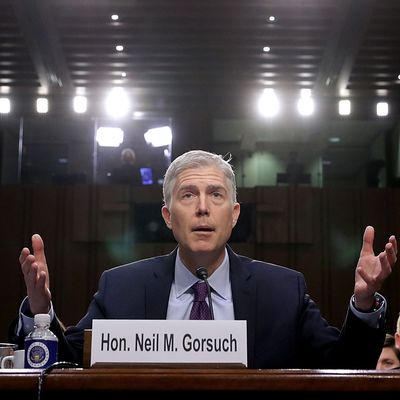
The Judiciary Committee confirmation hearings for Neil Gorsuch, Donald Trump’s nominee to replace the late Antonin Scalia on the Supreme Court, will cover a lot of ground — notably the prospective justice’s independence from the man who appointed him, as well as his precise views on the subject with which he was most identified as a lower-court judge: “religious liberty.”
The first day of the hearings was devoted to opening statements by the nominee and committee members, featuring a lot of relatively genial positioning and throat-clearing. Days two and three will give committee members the opportunity to question Gorsuch and argue with each other. Today, right off the bat, senators from both parties began probing the nominee with abstract-sounding questions that were mostly dog whistles for ancient and vicious controversies over the constitutional right to an abortion.
In his initial questions, Committee chairman Chuck Grassley clearly wanted to give Gorsuch the chance to define himself before Democrats could join the fray. At one point, he flatly asked the nominee how he felt about prior controversial Supreme Court decisions that could theoretically be overturned, including Roe v. Wade:
Gorsuch was asked Tuesday by Senate Judiciary Committee Chairman Charles Grassley to discuss the case that legalized abortion nationwide. The nominee would only say it’s a court precedent that has been reaffirmed many times. He gave similar answers to Grassley’s questions about other important cases on such subjects as guns and campaign finance.
This was actually a softball, since, by hallowed tradition, judges never, ever make statements about prospective cases they may have to later review. (If they do, as did Judge William Pryor in a comment calling Roe an “abomination,” it’s universally considered bad form and a near-disqualifier for SCOTUS.)
A more subtle and interesting question from Grassley involved the possibility that Gorsuch had submitted himself to some kind of “litmus test” in order to secure his nomination. Aside from anticipating a question Democrat Richard Blumenthal had already indicated he would ask, this point is an allusion to two facts surrounding Gorsuch’s selection: During the presidential campaign, Trump defied the usual rules of the SCOTUS game by saying he’d find someone sure to overturn Roe v. Wade. Then he turned over the vetting of candidates to two conservative groups, the Federalist Society and the Heritage Foundation, that would never knowingly promote a jurist who believed in a constitutional right to abortion.
Gorsuch, of course, denied he had performed any “litmus tests.”
Both Grassley and Ranking Minority Member Dianne Feinstein came at the abortion question from a different direction: How much weight does Gorsuch assign to the precedent set by decisions such as Roe in considering constitutional issues? Is Roe a “super-precedent,” Feinstein asked? His answer was in effect a nonanswer:
“It has been reaffirmed many times,” Gorsuch said. “I can say that.”
Nothing the judge has said so far — and nothing he will say before a final confirmation vote — is likely to change the assumption that he is a fourth vote on the Court to either overturn or significantly modify Roe. That is why many observers have been saying that it’s the next new face on the Court, not Gorsuch’s, that matters most.
It was Justice Kennedy’s vote for a decisive reaffirmation of Roe in a SCOTUS decision just last year — leaving the reverse-Roe faction two justices short of what they needed — that probably clinched the decision by Senate Republicans to block Merrick Garland’s appointment until the end of Barack Obama’s presidency. And now it could be RTLers, not pro-choice senators, who are most nervous about Gorsuch’s views.
The reason is simple: Anti-abortion activists believe they have been betrayed again and again by Republican presidents who placed justices on the Court who wound up supporting abortion rights to one extent or another. At one dramatic moment, in 1992, when Roe v. Wade looked to be especially endangered, all five justices who voted to save it were appointed by GOP presidents. Two of them, in fact, Justices O’Connor and Kennedy, were appointed by St. Ronald Reagan himself.
This is why Donald Trump was in a position to solidify his position not only with RTL folk, but with conservatives generally, by going about as far as any presidential candidate could go in promising a Supreme Court that would finally bring down the great white whale by gutting or killing abortion rights. It’s payoff time now, and people on both sides of the abortion battle know it. But sometimes it’s conveyed in code.






























